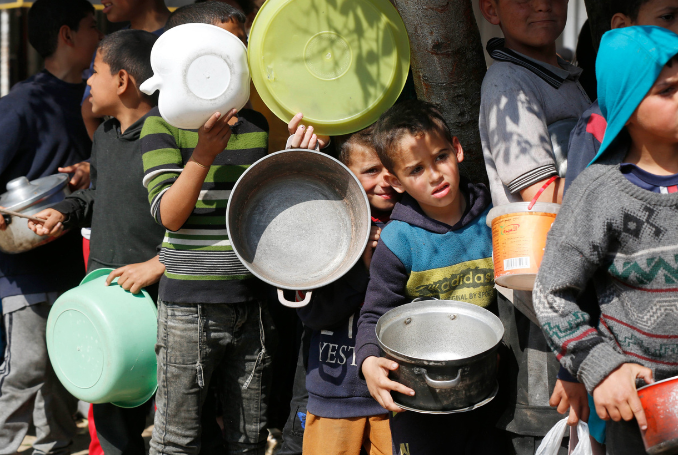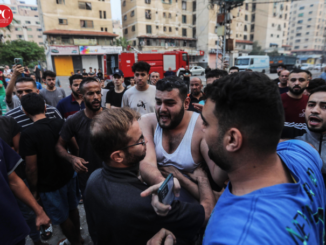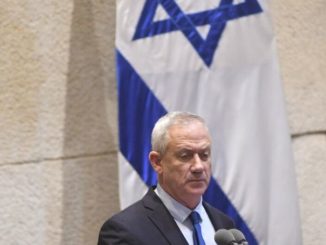
The three weeks of respite for the citizens of Gaza were not enough to recover from the harsh conditions they endured since the beginning of the war.
In April, residents of the war-torn Gaza Strip experienced a brief relief after nearly seven months of severe humanitarian conditions due to the hermetic Israeli blockade. Early in May, however, Israel announced the start of its military operation in the southern city of Rafah.
Subsequently, the Karem Abu Salem crossing – the only commercial crossing through which goods and aid are allowed into the Strip – was forcibly closed, leaving Gaza, especially the northern area, to face the specter of hunger once again.
“Markets are now literally empty. The situation is even worse than before mid-April,” Abu Elias, a 35-year-old survivor in northern Gaza, told The Palestine Chronicle.
“All you can find nowadays when you walk through Gaza’s streets are some cleaning materials. There is no way to find vegetables, fruits, meat, or even beans.”
Leaving it All Behind
The three weeks of respite for the citizens of Gaza were not enough to recover from the harsh conditions they endured since the beginning of the war.
Although the Karem Abu Salem Crossing was reopened by the Israeli army about ten days ago, Israel still refuses to allow any aid trucks into northern Gaza, leaving countless families in a desperate struggle for survival.
In parallel with the Rafah operation, the Israeli army also started another relentless operation in northern Gaza, forcing people to evacuate their shelters under heavy bombardment, leaving behind everything they had managed to stockpile.
Abu Elias, who lost his house in the Jabaliya Camp in October 2023, experienced a new wave of displacement, seeking shelter in the western part of the city.
“Everything I managed to buy in the previous weeks, I had to leave behind,” he told us.
With no transportation available, Abu Elias and his six-month pregnant wife had to walk about six kilometers from the Al-Amoudy area to the Al-Jalaa neighborhood.
Like many others, Abu Elias lost his modest craft in a curtain shop, which he relied on for day-to-day income.
“Essentials are absent from markets and prices have skyrocketed,” he stated, reflecting his financial inability to meet his personal and family needs, including his wife’s medications.
Empty-Handed
“By mid-April, markets were flooded with fresh produce, flour, and biscuits,” said Yousef, another survivor in northern Gaza.
“Everywhere you went, you saw smiley faces. People were overjoyed to carry bags of various vegetables and fruits for their children.”
But all the joy soon disappeared.
According to Yousef, people didn’t manage to stockpile large amounts of rations for several reasons. First, their financial capability was limited. Second, during the process of displacement, the only concern was fleeing death, making it impossible to carry supplies. Third, they did not expect famine to loom again.
Although Israel currently allows some humanitarian aid to enter northern Gaza through the Erez Crossing, it is grossly inadequate to meet the needs of about half a million Palestinians. Aggravating the humanitarian situation, Israel also prevents any commercial activities through the crossing.
Citizens must wait for their turn to receive either a bag of flour or a food parcel through the United Nations Relief and Works Agency for Palestine Refugees (UNRWA), a process that might take a month or more. Markets depend on what citizens sell from their UNRWA coupons.
“I go to popular markets two to three times a day, and often go home empty-handed due to the absence of what I need or the exorbitant prices,” Yousef said.
“Everything you might find in markets are some canned foods,” he explained.
Despite the serious need for humanitarian aid, Yousef, along with thousands of others, finds the aid humiliating.
“We need this terrible war to end,” he expressed angrily. “Aid is just a tool to distract the people of Gaza from their real sorrow. We don’t want to live on canned beans and hummus.”
Yousef believes Israel is doing everything it can to tighten its grip on the citizens of northern Gaza as punishment for their refusal to flee south. “The Israeli project aiming to migrate all Gazans is still in place, I believe,” he told us.
In addition to the restrictions on the movement of goods into the city, aid airdrops have also been halted since the start of May, plunging the local population into a deeper crisis.
Therefore, the humanitarian situation in northern Gaza stands on the edge of a real famine once again, yet the media does not put enough focus on this critical issue.
(The Palestine Chronicle)

– Noor Alyacoubi is a Gaza-based writer. She studied English language and literature at al-Azhar university in Gaza City. She is part of the Gaza-based writers’ collective We Are Not Numbers. She contributed this article to The Palestine Chronicle.







